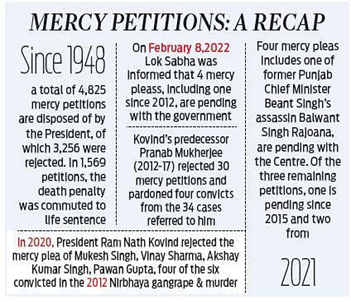

15th April 2023 (6 Topics)
Context
While asking states/appropriate authorities to decide on mercy petitions at the earliest, the Supreme Court has mentioned that inordinate delay in not deciding on mercy pleas will “frustrate the object and purpose of the death sentence.”
What is the Case?
- The apex court has highlighted that death row convicts were taking advantage of an inordinate delay in deciding mercy petitions.
- The efforts shall be made by the state government and/or the concerned authorities to see that the mercy petitions are decided and disposed of at the earliest, so that even the accused can also know his fate and even justice is also done to the victim.
- The court while directing the states also relied on the SC ruling on Jagdish vs. State of Madhya Pradesh wherein the court commuted the death sentence to life imprisonment after taking into consideration the delay in disposal of the mercy petition of above five years.
What is a Mercy petition?
- The mercy petition talks about the power to pardon the convict under a few sections of the criminal code of procedure.
- Mercy Petition lies in saving an innocent person from being punished due to miscarriage of justice or in cases of doubtful conviction.
|
Constitutional backing:
|
Procedure to apply for mercy petition:
- A convict under the sentence of death is allowed to file a mercy petition within a period of seven days after the date on which the Superintendent of Jail informs him about the dismissal of the appeal or special leave to appeal by the Supreme Court.
- The petitions are to be presented to the President of India. The President office seeks the cabinet advice.
- The appeal is examined by the Ministry of Home Affairs and the Ministry before giving recommendations to the President, takes the view of State concerned.
- There is no written procedure to deal with mercy petition.
- Judicial review:
- President’s pardon/rejection/delay is also subjected to judicial review.
- However, if a court finds that the process of the decision taken by the President under Article 72 was not arbitrary or unreasonable; the decision then cannot be interfered with.
|
A curative petition is the last judicial corrective measure which can be pleaded in any judgment or decision passed by the Supreme Court which is normally decided by Judges in-chamber. |
Who else can give pardon?
- In Dhananjoy Chatterjee alias Dhana v State of West Bengal, 1994 case the Supreme Court has said that “The power under Articles 72 and 161 of the Constitution can be exercised by the Central and State Governments, not by the President or Governor on their own”.
- The advice of the appropriate Government binds the Head of the state.
Difference between the pardoning power of President and Governor:
- Death sentence: President can pardon the death sentence but the Governor has no power to pardon the death sentence.
- Court-martial: The President can pardon in case of Court-martial. But the Governor cannot pardon in the court-martial.
- Jurisdiction: President exercises his judicial powers for the punishment which is given under the law made by the Union. Whereas the Governor exercises his judicial powers for the punishment which is given under the law made by the State.
More Articles


